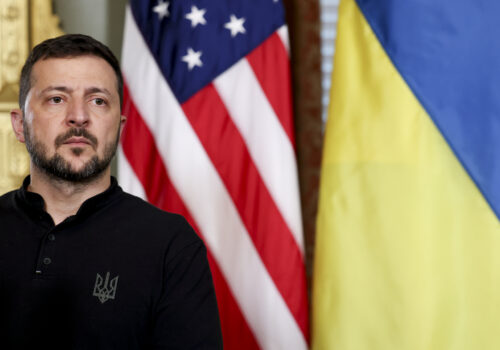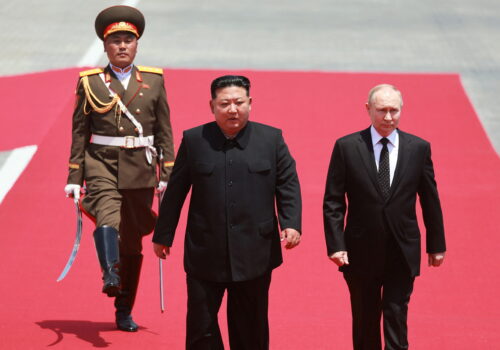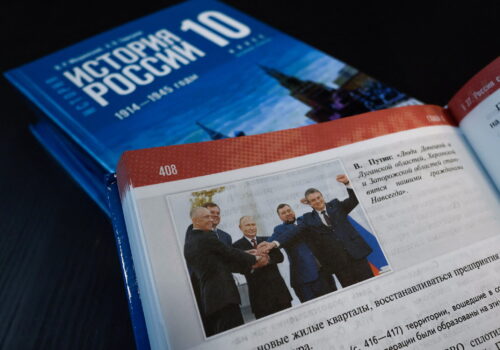World News – 2024 – Video Playlist | Video Playlists | Sites: | newsandtimes.org | links-newsandtimes.com | worldwebtimes.com | southcaucasusnews.com | russianworld.net | jossica.com | octobersurprise2016.org | bklyntimes.com | oceanavenuenews.com | fbireform.com | bloggersunite.net | octobersurprise-2024.org | Trump-News.org | Audio-Posts.com | Bklyn-NY.com | Posts Review – newsandtimes.org
The Russian invasion of Ukraine is often depicted in the Western media as a bloody stalemate with neither side able to achieve a decisive military breakthrough. While this has been the case for much of the war, there are growing indications that Russia may now be creating the conditions for victory in Ukraine.
For more than a year, Russia has held the battlefield initiative in southern and eastern Ukraine. While Moscow’s territorial gains have been relatively minor, the advances achieved by Putin’s army since late 2023 stand in stark contrast to the virtually static front lines of the previous year. Indeed, according to Germany’s Die Welt, Russian territorial gains during October 2024 were the largest since March 2022.
Russia’s offensive operations have focused on the Donbas region of eastern Ukraine, with Putin’s troops capturing a number of towns so far this year such as Avdiivka and Vuhledar as they advance toward Pokrovsk. If this trend continues during the coming months, Russia could be poised to complete the conquest of the Donbas during the 2025 campaigning season.
Stay updated
As the world watches the Russian invasion of Ukraine unfold, UkraineAlert delivers the best Atlantic Council expert insight and analysis on Ukraine twice a week directly to your inbox.
The success of Russia’s Donbas campaign owes much to Moscow’s traditional advantages in munitions and manpower, along with an apparent disregard for losses. Russia’s offensive has also benefitted from a number of tactical adaptations including the extremely effective use of glide bombs against Ukrainian defensive positions.
Over the past year, Russian commanders have been able to exploit a growing number of Ukrainian battlefield vulnerabilities. These Ukrainian weaknesses have included ineffective front-line fortifications, persistent troop shortages due to the mismanagement of Ukraine’s mobilization efforts, and extended delays in the delivery of military aid from the United States and Kyiv’s other Western partners.
Ukraine’s military setbacks have forced them to return to the tactics favored during much of the initial fighting in early 2022, which involved trading space for maximum enemy losses. This approach allows the Ukrainian military to impose heavy costs on the advancing Russians, but it also means abandoning any attempts to liberate occupied Ukrainian territories, for the time being at least.
While Russia’s recent offensive operations have not yet produced any decisive breakthroughs, the psychological impact of the advances achieved in recent months cannot be measured in kilometers alone. Crucially, Moscow’s localized successes in the Donbas are gradually undermining morale among the Ukrainian public. Regular reports of fresh Russian gains are also weakening the resolve of Kyiv’s Western partners and bolstering arguments against continued military support for Ukraine.
Eurasia Center events

The Russian invasion is not going entirely according to plan, of course. US, UK, and European officials have reported that September 2024 was the deadliest month of the entire war for Putin’s troops, with Russia suffering more than one thousand soldiers killed or injured every single day.
Russia has sought to address these catastrophic losses by enticing a steady stream of new recruits with ever larger bounty payments and inflated monthly salaries. The Kremlin is also scouring other branches of the Russian armed forces such as the navy and strategic rocket forces for troops who can be converted into infantry and sent to Ukraine. Most recently, Moscow has persuaded North Korea to provide thousands of additional troops.
The one thing Putin definitely does not want to do is announce another politically risky mobilization. So far, he looks to have found solutions that will allow Russia to maintain its offensive operations in Ukraine without mobilizing hundreds of thousands of Russian civilians.
As the Russian military gradually gains the upper hand in Ukraine, the Kremlin is also strengthening its position on the international stage by playing on the West’s fears of escalation. In recent months, Putin has openly intimidated Western leaders by threatening to revise Russia’s nuclear doctrine and significantly lower the threshold for the use of nuclear weapons. This latest example of nuclear blackmail has succeeded in derailing Ukrainian efforts to end Western restrictions on deep strikes inside Russia.
The Russian invasion of Ukraine is now at a critical juncture. Unless steps are taken in the coming few months to reverse today’s negative dynamics, Russia’s advantages will continue to grow until the military situation reaches the point of no return. Ukraine’s needs are well known, and include a significant increase in military aid along with the lifting of restrictions on the use of Western weapons. Above all, it is vital to maintain Ukraine’s fighting capability and impose increasing costs on the Kremlin while convincing Putin that Western support for Kyiv will not waver.
Much will depend on the outcome of the United States presidential election on November 5. Whoever wins the race for the White House, they will inherit a war in Ukraine that requires their urgent attention to prevent a Russian victory that would signal the decline of the West and transform the geopolitical landscape for decades to come.
Mykola Bielieskov is a research fellow at the National Institute for Strategic Studies and a senior analyst at Ukrainian NGO “Come Back Alive.” The views expressed in this article are the author’s personal position and do not reflect the opinions or views of NISS or Come Back Alive.
Further reading

UkraineAlert
Oct 15, 2024
As the US election nears, anxiety is mounting in Ukraine
By
Kate Spencer
Few countries have more at stake in the coming US presidential election than Ukraine, which is heavily dependent on US aid to sustain its fight against Russia’s ongoing invasion, writes Kate Spencer.

UkraineAlert
Oct 24, 2024
North Korean troops could help Putin avoid a risky Russian mobilization
By
Olivia Yanchik
Russian dictator Vladimir Putin has turned to his north Korean ally for troops to help cover his own army’s catastrophic losses in Ukraine and avoid a politically risky second wave of mobilization in Russia itself, writes Olivia Yanchik.

UkraineAlert
Oct 17, 2024
Russia is indoctrinating schoolchildren throughout occupied Ukraine
By
Tetiana Kotelnykova
The Kremlin is conducting a massive indoctrination campaign throughout schools in Russian-occupied Ukraine that underlines Moscow’s intention to erase Ukrainian national identity, writes Tetiana Kotelnykova.
The views expressed in UkraineAlert are solely those of the authors and do not necessarily reflect the views of the Atlantic Council, its staff, or its supporters.

The Eurasia Center’s mission is to enhance transatlantic cooperation in promoting stability, democratic values and prosperity in Eurasia, from Eastern Europe and Turkey in the West to the Caucasus, Russia and Central Asia in the East.
Follow us on social media
and support our work
The post Putin is creating the conditions for Russian victory in Ukraine appeared first on Atlantic Council.
World News – 2024 – Video Playlist | Video Playlists | Sites: | newsandtimes.org | links-newsandtimes.com | worldwebtimes.com | southcaucasusnews.com | russianworld.net | jossica.com | octobersurprise2016.org | bklyntimes.com | oceanavenuenews.com | fbireform.com | bloggersunite.net | octobersurprise-2024.org | Trump-News.org | Audio-Posts.com | Bklyn-NY.com | Posts Review – newsandtimes.org



